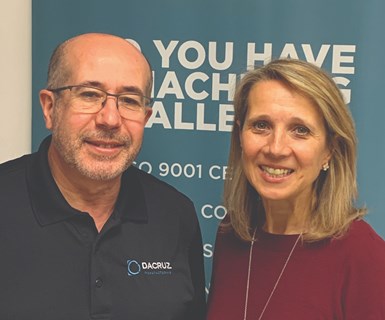The Bottom Line is the Byproduct of Good Work
Victor DaCruz, owner of DACRUZ Manufacturing in Bristol, Connecticut, shares industry experiences and his perspective on PMPA.

Victor and Betty DaCruz
PMPA: What is a brief history of DACRUZ Manufacturing?
Victor DaCruz: In 1981, I started C&M Screw Machine Products with Joe Machial. We quickly grew to be a key supplier to Jacobs Chuck Manufacturing Company where I had previously served my state of Connecticut Apprenticeship and worked with Joe. In 1990, we opened a plant in South Carolina to better serve Jacob’s Just In Time (JIT) program. In 1994, I realized that I didn’t want to move my family from Connecticut to South Carolina, so Joe and I amicably ended our partnership. My wife, Betty, is currently the CFO of DACRUZ Manufacturing and started with the company in 1995, and we decided to invest in new equipment. We purchased our first CNC in 1996 and our first CNC-Swiss in 2001. In 2005, we bought the 30,0000-square-foot space we occupy now in Bristol. It wasn’t until 2015 that we changed the name of the company to DACRUZ Manufacturing.
PMPA: Why the name change?
VDC: It’s important to me to stay on top of the latest technology in our industry. As we transitioned from multispindle screw machines to CNC machines, I realized that C&M Screw Machine Products didn’t reflect our changed environment.
PMPA: Who do you serve?
VDC: We serve small to midsize OEMs located mainly in the Northeast that need a responsive outsourcing partner. Our largest customer base is in the fluid control industry, but we also serve the automotive, medical, aerospace and firearms industries.
PMPA: When you took over the company after the partnership ended, did anything change?
VDC: Once the partnership ended, we made the conscious decision to concentrate on quality and service, and the last thing on our mind was the bottom line. Yes, the bottom line is critical to the success of a business, but the bottom line is a
byproduct of all the good work that we do. Bad decisions come out of a company that is focused on the bottom line. We pride ourselves in listening to the customer and providing them with what they want. Sometimes, we will also take parts that have a very small profit margin because we have a good relationship with the customer. Giving the customer positive outcomes should create new opportunities, which then takes care of the bottom line.
PMPA: How to you handle the industrywide issue of workforce?
VDC: We have been very successful in bringing in students from local high schools and other programs because we have gotten involved and developed a relationship with the schools. We enhance our workforce by training. We are state of Connecticut Apprenticeship Certified so we can have up to five partially wage-subsidized apprentices for 6,000 hours each. Apprentices get raises every six months and we are proud that many of them have stayed on at DACRUZ Manufacturing and are now key employees.
PMPA: Why do you value your PMPA membership?
VDC: I am fortunate that I have two perspectives on PMPA: as a member and as a board of directors officer. Belonging to the PMPA gives a company a huge competitive advantage. As a member, the resources PMPA provides are extremely valuable. Being a company owner is lonely — it’s critical to have resources and people within the industry who can help you. PMPA provides both. Plus, as an owner, it’s easy to just run the company and never interact with anyone outside of that circle. That puts a company at a disadvantage.
The experience I have had as a board of directors officer and going through the chairs has given me so many extra opportunities to meet new people and learn how people think. I have also developed very good friends at PMPA. I enjoy meeting with peers and competitors, and I appreciate them for who they are and for their talent. The PMPA and the connections I have made with other members has been instrumental in the development of my company.
Related Content
Craftsman Cribsheet No. 129: How to Beat the Heat
Shops tend to heat up in the summer. Here are some tips for staying cool in the warmer months.
Read MoreCraftsman Cribsheet No. 126: AISI System of Identification
Source: PMPA Prior to the Society of Automotive Engineers taking responsibility for Steel Grade nomenclature in the United States (1995), the American Iron and Steel Institute determined U.S. standard steel grades in collaboration with SAE.
Read MoreRoles of Women in Manufacturing: What I Learned
Over 20 women were featured in the Roles of Women in Manufacturing series, which started in January 2023.
Read MoreMachining Unleaded Materials — Reliability is Possible
Leaded steel is no longer produced in the United States. How do shops approach unleaded brass and steel machining?
Read MoreRead Next
A Tooling Workshop Worth a Visit
Marubeni Citizen-Cincom’s tooling and accessory workshop offers a chance to learn more about ancillary devices that can boost machining efficiency and capability.
Read More5 Aspects of PMTS I Appreciate
The three-day edition of the 2025 Precision Machining Technology Show kicks off at the start of April. I’ll be there, and here are some reasons why.
Read MoreEmerging Leaders Nominations Now Open
Here’s your chance to highlight a young person in your manufacturing business who is on the path to be a future leader moving your company forward.
Read More





















